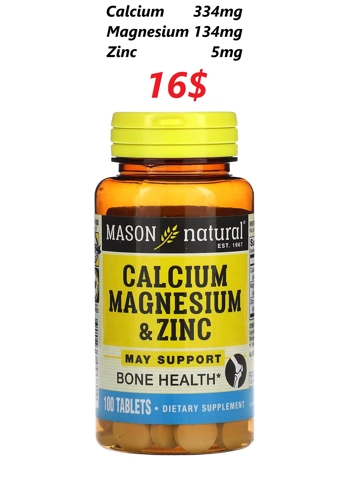Calcium Magnesium & Zinc 100' - Mason Natural
Calcium is an essential nutrient found in many foods, such as dairy products. The bones and teeth contain over 99% of all calcium in the human body.
Magnesium is a mineral that is important for normal bone structure in the body. People get magnesium from their diet, but sometimes magnesium supplements are needed if magnesium levels are too low. Low magnesium levels in the body have been linked to diseases such as osteoporosis, high blood pressure, clogged arteries, hereditary heart disease, diabetes, and stroke.
Zinc is an essential trace element commonly found in red meat, poultry, and fish. It is necessary in small amounts for human health, growth, and sense of taste.
Bones are always breaking down and rebuilding. Calcium is needed for this process, but the concentration of calcium in the body tends to decline with age. Taking extra calcium helps the bones rebuild and stay strong. The heart, nerves, and blood-clotting systems also need calcium.
An easy way to remember foods that are good magnesium sources is to think of fiber. Foods that are high in fiber are generally high in magnesium. Dietary sources of magnesium include legumes, whole grains, vegetables (especially broccoli, squash, and green leafy vegetables), seeds, and nuts (especially almonds). Other sources include dairy products, meats, chocolate, and coffee. Water with a high mineral content, or "hard" water, is also a source of magnesium.
Zinc is found throughout the body. The body doesn't store excess zinc, so it must be obtained from the diet. It's needed for immune function, wound healing, blood clotting, thyroid function, and much more. It also plays a key role in maintaining vision and might have effects against viruses.
People commonly take calcium by mouth for the treatment and prevention of low calcium levels, muscle cramps, osteoporosis, softening of the bones, and PMS. It is also used for high blood pressure, cancer, stroke, and many other conditions.
Magnesium is most commonly used for constipation, as an antacid for heartburn, for low magnesium levels, for pregnancy complications called pre-eclampsia and eclampsia, and for a certain type of irregular heartbeat (torsades de pointes).
People commonly use zinc for zinc deficiency, diarrhea, and Wilson disease. Zinc is also used for acne, diabetes, anorexia, burns, and many other purposes.

